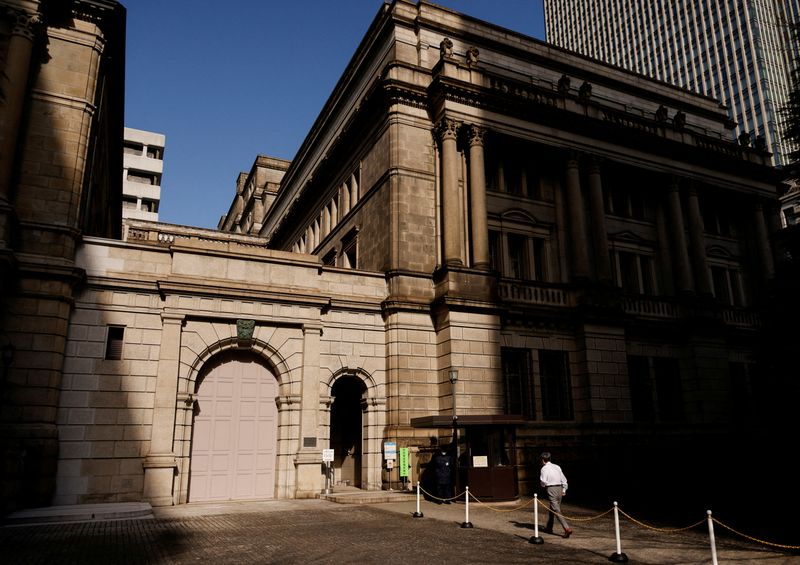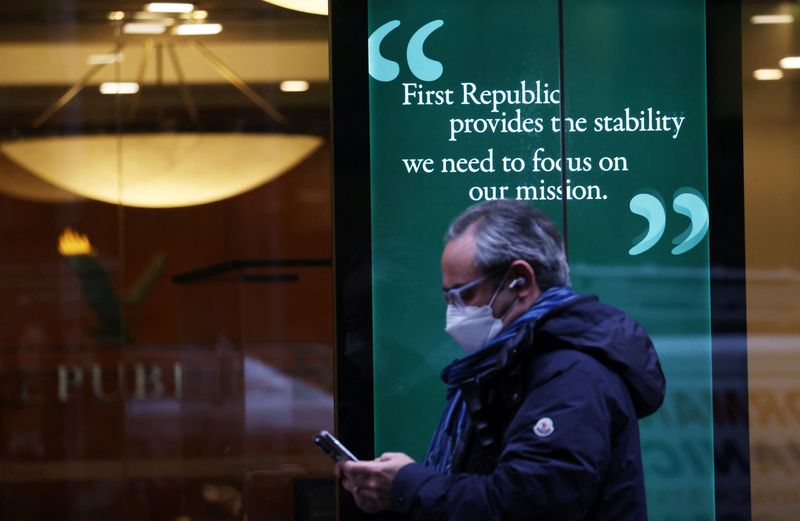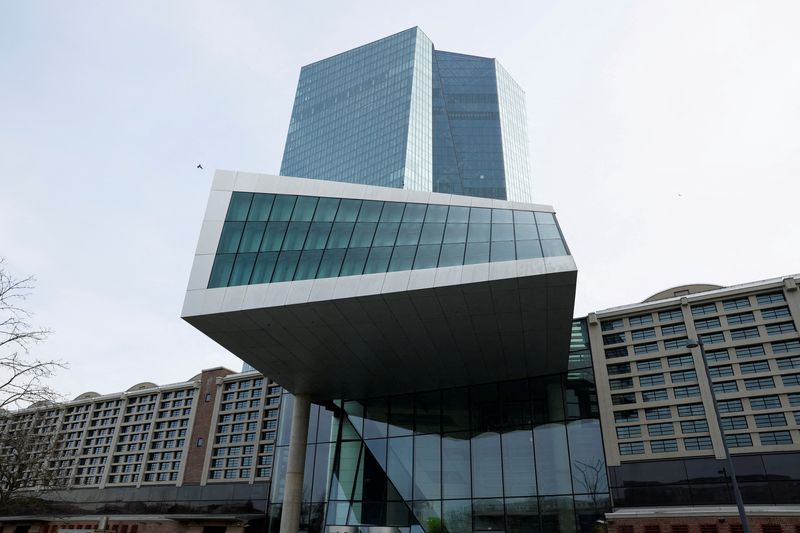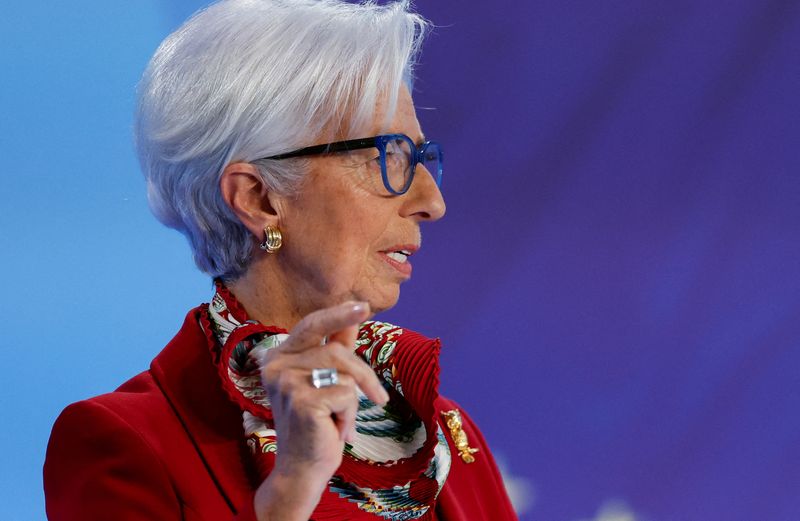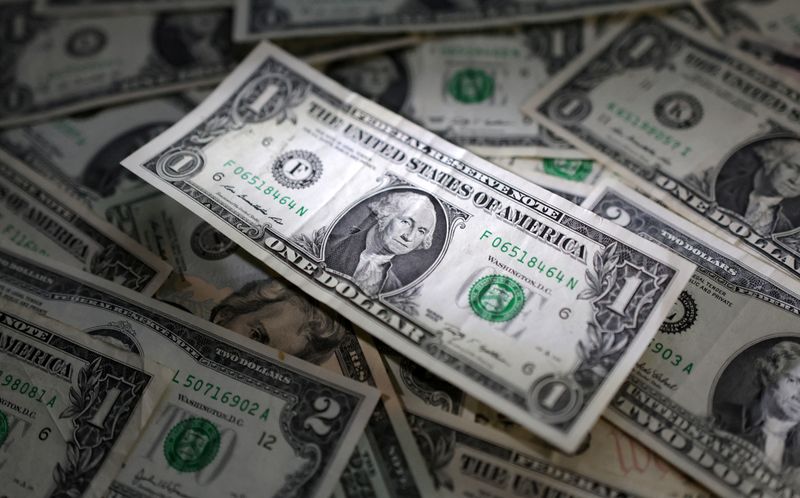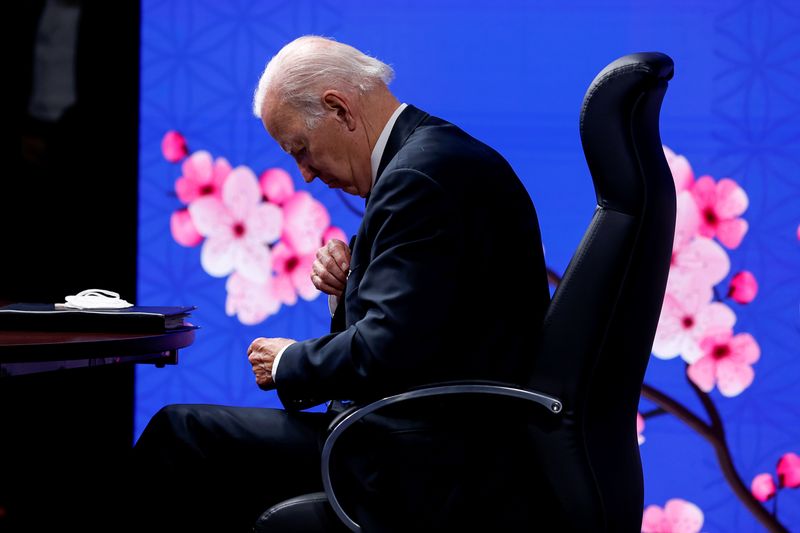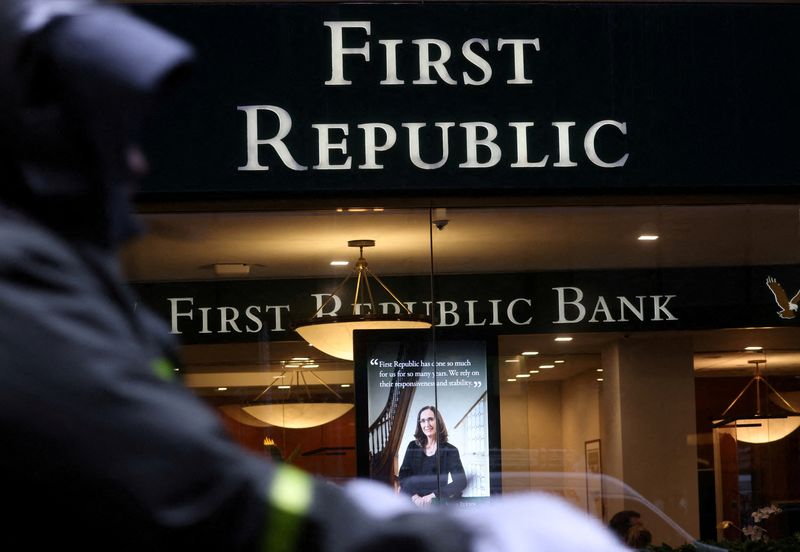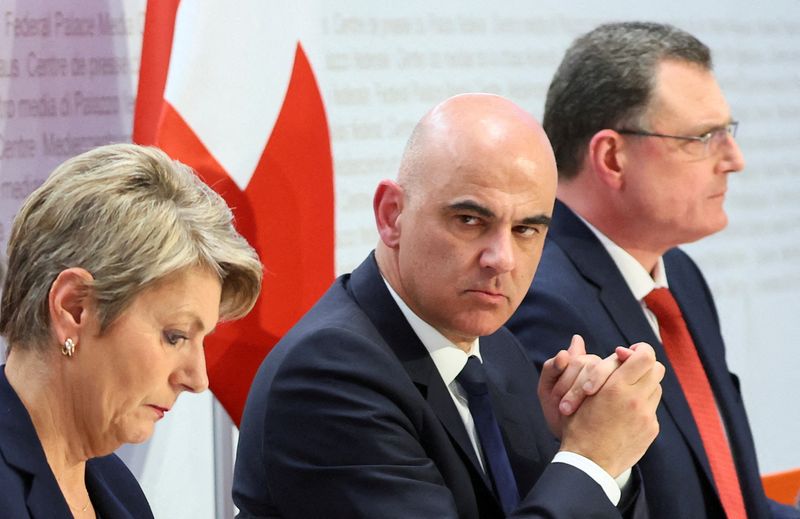LONDON/NEW YORK (Reuters) -UBS sealed a deal to buy rival Swiss bank Credit Suisse in an effort to avoid further market-shaking turmoil in global banking, Swiss authorities said on Sunday.
Meanwhile, global central banks said they would open daily dollar taps to their banks.
Here are comments from market analysts:
CITI FOREIGN EXCHANGE STRATEGISTS:
“To rectify banking stress, the best bet is to address undercapitalised institutions, provide transparency about asset quality and ample liquidity alongside. U.S. and Swiss authorities have provided timely access to ample liquidity (including the new Fed BTFP facility and Swiss emergency liquidity), three U.S. regional banks were closed and Credit Suisse taken over, plus increasing the availability of central bank USD swap lines.
These measures are important, but additional ones are likely required to stabilise confidence in regional U.S. banks in particular. Raising the FDIC cap on insured deposits (potentially uncapping it) would be helpful, but capital injections are likely to be more effective, and probably necessary.
Ad: Save every day with Amazon Deals: Check out today's daily deals on Amazon.
Encouragingly, discovery of new asset quality weaknesses in this crisis so far has been limited, outside of regional U.S. banks. If that continues, we are hopeful that policymakers and private entities will address the remaining gaps fairly promptly, and we therefore do not see a spiraling (global) financial crisis, even if some stresses are unavoidable.”
JEFFERIES’ EUROPEAN ANALYSTS:
“It’s positive news that a deal could be found as there were not many alternatives, and a nationalisation or unwinding of CS would likely have increased sector risks.
“However, in terms of sector ramifications, while this deal significantly reduces the immediate systemic risk from CS’ weaknesses, we think two key negatives elements will also catch the eye: (1) that CS’ AT1 holders are wiped out whereas shareholders are not entirely, though normally more junior in creditworthiness, and (2) that shareholder approval was not asked on UBS’ side for this deal. We think the objective of this transaction, while solving CS’ situation & associated risks for the system, is to reach a win/win, where UBS shareholders also get value out of this deal over time.
“The low price paid (3 billion Swiss francs) and significant safety net provided to UBS (with government guarantee) are positive, while UBS’ strategy is unchanged. However, UBS embarks significant execution risk, litigation risk, the buyback is temporarily suspended (unclear how long), UBS’ capital requirement is likely to be revised up, and management focus will be captured by this deal for many quarters, maybe years.”
BRIAN MARTIN, ANZ HEAD OF G3 ECONOMICS, LONDON:
“Policy makers will be hoping that the weekend’s UBS buyout of troubled Credit Suisse will draw a line under recent market stresses. Central banks were already facing the conundrum of “how much is enough?” in the face of resilient labour markets, given the lags with which their policy decisions affect economies. They now have a new conundrum: “how much is too much?” for financial stability? It’s one thing to ask economies to take their medicine in terms of a near-term growth vs inflation trade-off, but financial instability isn’t medicine; it’s toxic.
“Central banks are trying to separate monetary policy and financial stability concerns, but that’s easier in theory than in practice. Nonetheless, inflation remains a major problem for the Fed, and as such a 25 basis points hike in the fed funds rate this week looks favoured in our view.”
MARK CHANDLER, CHIEF MARKET STRATEGIST, BANNOCKBURN GLOBAL FOREX, NEW YORK:
“People have known about Credit Suisse for a while, but it came to a head. The U.S. regional banking stress that we have is a different problem. The regional banks have come under pressure because they are less equipped to handle a withdrawal of deposits the way the big banks are. They are more susceptible to the leaving of deposits and when the Federal Reserve reduces reserves, it hits them disproportionately.”
JAMES BIANCO, PRESIDENT, BIANCO RESEARCH, CHICAGO:
“(The central bank action is) a form of QE right out of the COVID/2008 playbook. Couple that with the record discount window borrowing and the expansion of the balance sheet, and the tide is turning to an easier Fed.
“One of two things happens, they move too slowly and the financial crisis worsens. They move fast enough to stem the crisis, and the massive amount of stimulus means an even bigger inflation problem in 2H 2023 and into 2024.
“Only one good option, everyone decides on their own to transfer hundreds of billions of deposits back in regional banks. The point is there are only bad options and worse options as long as money is leaving regional banks.”
MICHAEL PURVES, CHIEF EXECUTIVE OF TALLBACKEN CAPITAL ADVISORS, NEW YORK:
“In March 2020, amid COVID, the Fed saw a surge in the dollar… So (the) Fed aggressively put in lines to every major central bank. Today, the Fed is pulling out the same playbook. Now you have a small country with two giant banks, one of them was obviously under a huge pressure. So this is sort of a tool the Fed has to alleviate this type of shock stress and it doesn’t necessarily cost them that much to do it.
“The Fed wants to make sure the Swiss Central Bank isn’t going to have any problems.
“The line doesn’t really necessarily cost the Fed that much and it’s not necessarily not overtly inflationary anyway.
“Whatever global macro crisis you want to look at, people rush to buy dollars – that can be very destabilising to some of international economies.”
EDWARD MOYA, SENIOR MARKET ANALYST, OANDA, NEW YORK:
“The global financial system is still at great risk, and central bankers are showing they learned lessons from GFC and are trying to get in front of this. More banks are at danger and coordinated action might buy some banks some time.”
JEFF GITTERMAN, CEO OF ESG-FOCUSED GITTERMAN ASSET MANAGEMENT, NEW JERSEY:
“(It) feels like ’08 again a bit.
“I think the rating agencies will have to keep up with more downgrades than this past week which will pressure the banks even more. This will most likely spook investors and more selling of regionals to continue. I don’t see how we don’t enter a recession, as most failures of banks or financial institutions immediately preceded a recession. So a 10% to 15% market drop (is) likely especially if the Fed still goes 25 which I think they probably will, although I would not bet on it.”
MARSHALL FRONT, CHIEF INVESTMENT OFFICER, FRONT BARNETT ASSOCIATES, CHICAGO:
“This (central bank action) is no surprise. They have done this on other occasions when there was a liquidity risk. Some on Wall Street also see the possibility (of) further Fed actions to shore up confidence in the US banking system to stem additional runs. For example, there is an explicit guarantee for depositors’ balances above $250,000 at certain institutions. Some expect those guarantees to be broadened, increasing and possibly extending the amount to other institutions.
“Given the fragility of the current situation, banking regulators will certainly have given these options consideration. Whether they act to do so is an open question.”
MIKE O’ROURKE, CHIEF MARKET STRATEGIST, JONES TRADING:
“It should be clear that after more than a week into the banking panic, and two interventions organised by the authorities, this problem is not going away. Quite the contrary, it has gone global. The reports that UBS is acquiring Credit Suisse will likely magnify Credit Suisse’s problems by moving them to UBS.
“The prime concern of every bank for the immediate future is preventing deposit flight. It should be clear that the most expedient and effective solution to this crisis is an expansion and modernisation of the FDIC deposit insurance regime. It has become vastly apparent that the banking industry and its regulators were not prepared for a banking crisis in the instantaneous information era.”
CHRIS MARINAC, DIRECTOR OF RESEARCH, JANNEY MONTGOMERY SCOTT:
“This (CS/UBS deal) is a transaction designed to clear the market so European credit access can move forward. The Credit Suisse issues are not new and needed to be resolved years ago. Thank goodness something finally happened.”
JOHANN SCHOLTZ, EQUITY ANALYST AT MORNINGSTAR, COVERING EUROPEAN BANKS, AMSTERDAM:
“Under normal circumstances, I would say it is an absolutely fantastic deal for UBS, but in the current environment it is a bit more complicated as there is a lot of uncertainty generally in the markets. One big fear would be that some of the concerns about Credit Suisse just spill to UBS.
“Some area of concern, which we need more clarity, is the extent of the outflows from Credit Suisse and also the restructuring costs that UBS will incur. I think they will be able to offset restructuring costs against large negative goodwill that they created through this deal.
“The franchise of Credit Suisse is worth much more than the price UBS is paying for it, so I think Credit Suisse shareholders will actually feel a little bit of grief.
“In the past, when a deal between Credit Suisse and UBS was discussed, a sticking point would be concentration, especially in the domestic market. An IPO of the domestic unit now is obviously an option for UBS, but it is also the most stable part of the business that generates quite a lot of cash. If UBS is not required to do an IPO of it, it could make sense for them to keep it. There are lots of synergies.”
JONATHAN MACEY, PROFESSOR OF CORPORATE LAW, CORPORATE FINANCE AND SECURITIES LAW, YALE UNIVERSITY:
“The lack of (a) shareholder vote reflects the dire condition of Credit Suisse and indicates how much time pressure the banks and the regulators were under to get this deal done in light of the huge outflows of funds from Credit Suisse since late 2022. About $17 billion of a bonds known as AT1s will be written off in this deal, which reflects a significant haircut for non-depositor creditors.
“Under Swiss law, UBS would have had to give shareholders six weeks to consider the acquisition, which was far too much time under the circumstances. Also, given the discount in the merger price to the market price of Credit Suisse’s stock, there was a real chance that shareholders would not have approved the transaction.”
BRIAN JACOBSEN, SENIOR INVESTMENT STRATEGIST AT ALLSPRING GLOBAL INVESTMENTS, U.S.:
“It seems like a very large and decisive intervention. Provided markets don’t sniff out other lingering problems, I’d think this should be pretty positive. Governments are intent on snuffing out the spark of contagion before the flames get out of control.
“The CS/UBS deal should be good enough to improve sentiment, but there will still be lingering questions about regional banks in the U.S. and whether there are hidden risks in European banks. There is always something to worry about.”
MICHAEL ROSEN, CHIEF INVESTMENT OFFICER, ANGELES INVESTMENTS, SANTA MONICA, CALIFORNIA:
“The UBS-CS deal is the best solution the market could have hoped for. CS shareholders are essentially wiped out, and some (AT1) bondholders will be wiped out, but the basic functioning of the banking system was protected.
“Bank stocks should rally on the news, but it is premature to signal all-clear. Monetary tightening has eviscerated bank margins, and a reversal of tight monetary policy is not possible with inflation significantly, and stubbornly, higher than target. More broadly, and more importantly, tight monetary policy and a fragility in the banking system raise the risks of recession, thus contributing to more fragility in the banking sector.
“Markets may celebrate the rescue of CS, but it will be a short celebration.”
OCTAVIO MARENZI, CEO, OPIMAS, VIENNA:
“Switzerland’s standing as a financial centre is shattered – the country will now be viewed as a financial banana republic.
“The Credit Suisse debacle will have serious ramifications for other Swiss financial institutions. A country-wide reputation with prudent financial management, sound regulatory oversight, and, frankly, for being somewhat dour and boring regarding investments, has been wiped away.
“This deal is bound to generate legal and political resistance. First, the Federal Council has made use of emergency powers to force this merger through. A legal challenge by Credit Suisse shareholders, who will claim that their property has been illegally confiscated, is guaranteed.
“UBS shareholders, for their part, could well revolt against this deal, seeing a risk that Credit Suisse could prove to be a millstone around UBS’ neck that will drag both banks under. Secondly, the guarantees are bound to be challenged politically through Switzerland’s system of direct democracy – getting the necessary 100,000 signatures to put this deal to a vote of the people will happen in a matter of days.”
MARCHEL ALEXANDROVICH, EUROPEAN ECONOMIST, SALTMARSH ECONOMICS, LONDON:
“Central banks are stepping in and the SNB (Swiss National Bank) is offering to provide liquidity if needed. There’s also fiscal policy, so policymakers are doing their bit.
“The ECB will be hoping that this draws a line under the events of the last 10 days and concern about financing conditions start to stabilise and ease.
“If you come in and see markets have taken this well, we should see a pricing in of further rate increases.
“If they don’t take it well, then the views on the ECB will not shift and potentially if the crisis continues focus, will be on what the ECB can to alleviate this.”
HOLGER SCHMIEDING, CHIEF ECONOMIST, BERENBERG, LONDON:
“They’ve (Swiss authorities) seen a problem, are dealing with it and that’s a very positive sign for markets.
“That doesn’t meant that it’s all over but there’s no need to panic. The relief for market is that systemic risk is contained.”
(Reporting by the finance and markets team, Carolina Mandl in New York, Ross Kerber in Boston; Compiled by Dhara Ranasinghe, Megan Davies and Anshuman Daga; Editing by Tommy Reggiori Wilkes, Jamie Freed and Jacqueline Wong)


